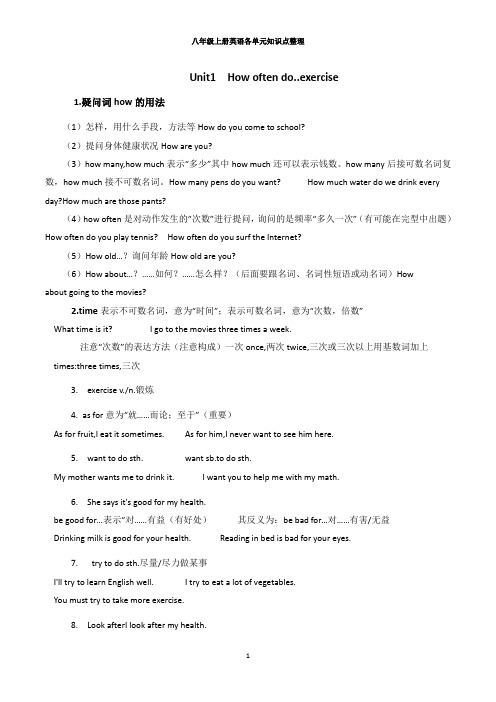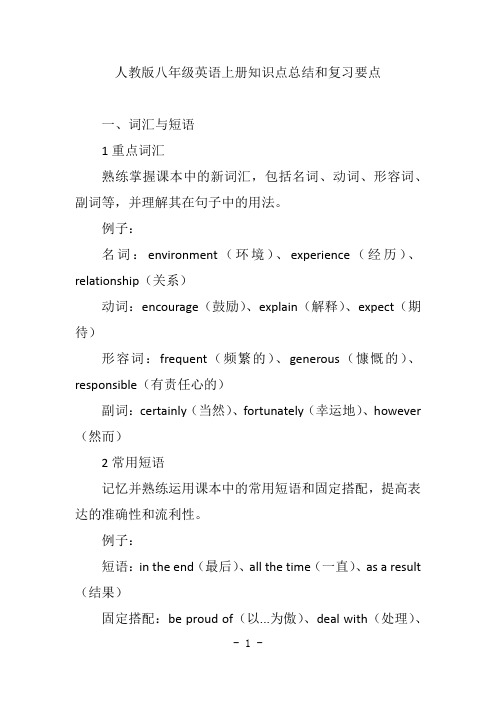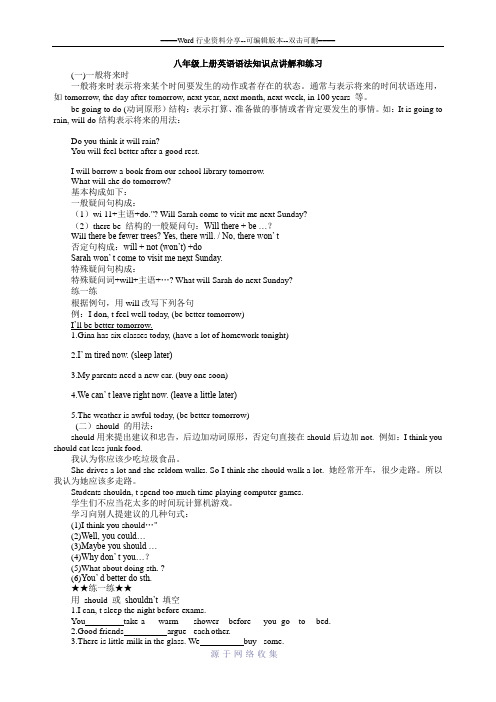(完整版)八年级上英语复习知识点及习题整合
新版八年级英语上册Module 1 知识点归纳及习题训练(无解析)

八年级英语上册Module 1 :How to learn English必会短语部分1. 尽力去做某事:try to do sth2. 尽力不要去做某事:try not to do sth3. 尝试着做某事:try doing sth4. 尽可能多地:as much as possible5. 尽可能地……:as ……as possible = as……as you (sb) can6. 一双、一对……:a pair of……(由两部分组成一个完整事物的名词)7. 练习做某事:practise doing sth 8. 把……与……匹配、连接:match……with…9. 意思是,意味着:the meaning of…… = mean…10. 犯错误:make a mistake = make mistakes11. 查找:look up (指在字典,工具书中查找,同时注意代词宾格放中间的用法)12. 欢迎(回到)……:welcome (back) to……13. 好主意:a good idea14. 写下来:write down 15. 听广播:listen to the radio16. 大声地拼读:spell and pronounce aloud 17. 对……有好处:be good for……18. 擅长……:be good at…… = do well in……19. 某人真是太好了:be good of sb20. 需要做某事:need to do sth 21. 同意某人的观点:agree with sb22. 关键词和主要意思:key words and main ideas 23. 向某人微笑:smile at sb24. 面带微笑:with a smile on one’s face 25. 把……发送给……:send …… to……26. 学英语的好方法:the great ways to learn English 27. 寻求,请求给予:ask for / ask sb for28. 如何提高他们的英语:how to improve their English ( 疑问词+to do 的短语结构)29. 几次,几遍:several times 30. 谈论:talk about31. 害怕,不敢去做某事:be afraid to do sth 32. 对……事情担心,害怕:be afraid of ……33. 展开会话,交谈:start a conversation 34. 感到害羞:be shy = feel shy(新版)八年级英语Module 1 单词,短语检测1. 改进,提高________________2. 害羞的___________________3. 练习_______________4. 改正,纠错,错误的______________________5. 词典,字典_____________________6. 意见,建议_________________7. 大声地___________________8. 忘记____________________9. 单词,字词_________________ 10. 拼写____________________ 11. 赞同___________________ 12. 可能的____________________ 13. 错误,过错______________ 14. 对,双_________________ 15. 关键性的,重要的______________ 16. 快地,迅速地_______________ 17. 语法____________ 18. 发……的音__________________ 19. 发音__________________ 20. 理解,明白_____________ 21. 查找,查阅________________________________ 22. 犯错误_____________________________ 23. 写下来,记下来____________________________ 24. 同意某人的(看法)__________________ 25. 寻求,请求某人给予________________________26. 向某人微笑_________________________ 27. 练习做某事________________________________28. 尽力去做某事_______________________ 29. 尽力不要去做某事__________________________30. 忘记去做某事_______________________ 31. 需要去做某事______________________________32. 建议某人去做某事___________________ 33. 尽可能的……______________________________34. 害怕,不敢去做某事_________________ 35. 对……事情担心害怕________________________36. 忘记了做过某事_____________________ 37. 尝试着做某事______________________________38. 听广播_____________________________ 39. 做某事的方法______________________________40. 感到害羞___________________________(新版)八年级英语上册Module 1 : How to learn English复习材料1. look up:查阅,查找(考点):【动词+副词】组成的短语如:look up / write down / pick up使用规律:代词宾格放中间,具体名词放两边2. Welcome back:欢迎回来(考点):①作动词:welcome sb (back) to……:欢迎某人(回)到……地方②作名词:give sb a warm welcome:热烈欢迎某人3. Ready?准备好了吗?(考点):①be ready to do sth = get ready to do sth:准备好去坐某事②be ready for sth = get ready for sth:为某事做好准备4. advice:建议(考点):①advice(不可数名词):表达数量时用:a piece of advice 或pieces of advice②advice→(动词) advise:常用短语:advise sb to do sth(建议某人去坐某事)5. suggest:建议,提建议(考点):①suggest(动词)→suggestion(可数名词):give sb some suggestions(给某人一些建议)②suggest不连接( to do sth ),可以连接( doing sth ) 或( that引导的宾语从句)6. 辨别:speak / say / tell / talk的用法:①speak:说,讲(指讲话的方式,连接语言类单词)②say:说(指具体说的动作,连接说话的内容)③tell:告诉,讲述(一般构成短语:tell sb about sth / tell sb to do sth / tell sb not to do sth )④talk:谈论,交谈(指双方的互动,一般构成短语:talk about…… / talk with sb = talk to sb )7. try:努力,尝试(考点):try to do sth:努力去做某事try not to do sth:尽量不要去坐某事try one’s best to do sth:尽某人最大努力去坐某事try doing sth:尝试着做某事8. forget:忘记/ remember:想起(考点):①forget to do sth:忘记了去做某事remember to do sth:想起了要去做某事(这种结构代表“事情还没有做”)②forget doing sth:忘记做过某事remember doing sth:想起了做过某事(这种结构代表“事情已经做过”)9. Why not write down the mistake in our notebooks?(考点):①句型:Why not + do sth? = Why don’t you + do sth? 为什么不去做某事呢?②mistake:(不可数名词)错误常用短语:make a mistake / make mistakes:犯错误by mistake:错误地(副词)10. What else?还有其他的吗?(考点):①else 和other的辨别:else:别的,其他的→通常用在疑问词或不定代词后边使用other:其他的→修饰名词,通常放在名词前边使用②other 和the other的辨别:other:指“其他的一些”,other+复数名词= others(缩写形式)the other:指“其他的全部”,the other +复数名词= the others(缩写形式)③another 和the other的辨别:another:指“三者或以上”当中的另一个,another+单数名词the other:指“两者”当中的另一个,one is…… the other is……:一个……另一个……11. read aloud:大声地朗读(考点):辨别aloud / loud / loudlyaloud(副词):强调声音大道能够被听见。
(完整版)八年级上册英语各单元知识点

Unit1 How often do..exercise1.疑问词how的用法(1)怎样,用什么手段,方法等How do you come to school?(2)提问身体健康状况How are you?(3)how many,how much表示“多少”其中how much还可以表示钱数。
how many后接可数名词复数,how much接不可数名词。
How many pens do you want? How much water do we drink every day? H ow much are those pants?(4)how often是对动作发生的“次数”进行提问,询问的是频率“多久一次”(有可能在完型中出题)How often do you play tennis? How often do you surf the Internet?(5)How old…?询问年龄How old are you?(6)How about…?……如何?……怎么样?(后面要跟名词、名词性短语或动名词)Howabout going to the movies?2.time表示不可数名词,意为“时间”;表示可数名词,意为“次数,倍数”What time is it? I go to the movies three times a week.注意“次数”的表达方法(注意构成)一次once,两次twice,三次或三次以上用基数词加上times:three times,三次3. exercise v./n.锻炼4. as for意为“就……而论;至于”(重要)As for fruit,I eat it sometimes. As for him,I never want to see him here.5. want to do sth. want sb.to do sth.My mother wants me to drink it. I want you to help me with my math.6. She says it's good for my health.be good for…表示“对……有益(有好处)其反义为:be bad for…对……有害/无益Drinking milk is good for your health. Reading in bed is bad for your eyes.7. try to do sth.尽量/尽力做某事I'll try to learn English well. I try to eat a lot of vegetables.You must try to take more exercise.8. Look afterI look after my health.My brother is ill. I have to look after him today.He often helps his mother look after his little sister.9. help sb.(to)do sth.帮助某人做某事(to大多都是省略)My healthy lifestyle helps me get good grades. She often helps me learn math.10. the same as…与……一样Is her lifestyle the same as yours or different?She looks the same as her sister.11. I think I'm kind of unhealthy.kind of=a little有点儿(重要短语);a kind of一种12. although=thoughAlthough he's ill,he goes to school on time.13. keep in good health(重点掌握)=keep healthy=stay healthykeep+形容词表示保持某种状态A lot of vegetables help you to keep in good health.Keep quiet!The baby is sleeping. We must keep our classroom clean14. That sounds interesting.look(看起来),sound(听起来),smell(闻起来),taste(尝起来),feel(觉得),seem(好象),grow(变得),get(变得)等词在英语中可用作系动词,后跟形容词作表语。
人教版八年级英语上册知识点总结和复习要点

人教版八年级英语上册知识点总结和复习要点一、词汇与短语1重点词汇熟练掌握课本中的新词汇,包括名词、动词、形容词、副词等,并理解其在句子中的用法。
例子:名词:environment(环境)、experience(经历)、relationship(关系)动词:encourage(鼓励)、explain(解释)、expect(期待)形容词:frequent(频繁的)、generous(慷慨的)、responsible(有责任心的)副词:certainly(当然)、fortunately(幸运地)、however (然而)2常用短语记忆并熟练运用课本中的常用短语和固定搭配,提高表达的准确性和流利性。
例子:短语:in the end(最后)、all the time(一直)、as a result (结果)固定搭配:be proud of(以...为傲)、deal with(处理)、pay attention to(注意)二、句型与语法1基本句型熟练掌握五种基本句型,包括主语+谓语、主语+谓语+宾语、主语+谓语+间接宾语+直接宾语、主语+谓语+宾语+宾语补足语、主语+系动词+表语。
例子:主语+谓语:She sings.(她唱歌。
)主语+谓语+宾语:I like apples.(我喜欢苹果。
)主语+谓语+间接宾语+直接宾语:He gave me a book.(他给了我一本书。
)主语+谓语+宾语+宾语补足语:I found the book interesting.(我发现这本书很有趣。
)主语+系动词+表语:She is beautiful.(她很漂亮。
)2时态深入学习并掌握现在完成时、过去进行时、一般将来时、过去将来时等时态的用法和形式。
例子:现在完成时:I have already seen that movie.(我已经看过那部电影了。
)过去进行时:They were playing football when I called them.(我打电话给他们时,他们正在踢足球。
人教版八年级上册英语Units1-10单元知识点完整归纳以及练习题

人教版八年级上册英语Units1-10单元知识点完整归纳以及练习题人教版八年级上册英语Units1-10单元知识点完整归纳以及练习题Unit1 go on vacation去度假stay at home待在家里go to the mountains去爬山go to the beach去海滩visit museums 参观博物馆go to summer camp去参观夏令营quite a few相当多study for为……而学习go out 出去most of the time大部分时间taste good尝起来很好吃have a good time=have fun玩得高兴+v.ing X Kb1 .C of course当然feel like给……的感觉;感受到go shopping去购in the past在过去walk around四处走走because of因为one bowl of…一碗……the next day第二天drink tea喝茶find out找出;查明go on继续take photos照相something important重要的事up and down上上下下come up出来buy sth. for sb. / buy sb. sth.为某人买某物taste + adj. 尝起来……look+adj. 看起来……nothing…but+动词原形除了……之外什么都没有seem+(to be)+ adj. 看起来……arrive in+大地点/ arrive at+小地点到达某地decide to do sth.决定去做某事try doing sth.尝试做某事/ try to do sth.尽力去做某事forget doing sth.忘记做过某事/ forget to do sth.忘记做某事enjoy doing sth.喜欢做某事want to do sth.想去做某事start doing sth.开始做某事stop doing sth. 停止做某事dislike doing sth. 不喜欢做某事keep doing sth.继续做某事keep sth+adj.使…保持…状态Why not +v.?=Why d on’t you+v.?为什么不做……呢?so+adj.+that+从句如此……以至于……tell sb. (not) to do sth. 告诉某人(不要)做某事feel like +n./v.ing sth 想要…想要做…一、根据句意,用所给单词的适当形式填空。
新版八年级英语上册Module 2知识点归纳及习题练习(无解析)

外研版八年级英语上册Module 2必会短语部分1. 很好,非常好:pretty good2. 在海岸线上:on the coast3. 大约30年以前:about thirty years ago4. 一座更新的城市:a newer city5. 其实,实际上:in fact6. 变得重要:become important7. 在20世纪80年代:in the 1980s 8. 更大更繁华:bigger and busier9. 像……一样……:as……as……10. ……的人口:the population of……11. 超过,多余,大于:over = more than 12. 想要去做某事:would like to do sth13. 想着/记着去做某事:remember to do sth 14. 想起/记着做过某事:remember doing sth 15. 总有一天:one day 16. 来自……:come from…… = be from……17. 因为……而出名:be famous for……18. 作为……而出名:be famous as……19. 为某人所熟知:be famous to……(sb) 20. 比如……:such as……21. 喜欢乘船沿河旅行:enjoy trips along the river by boat 22. 750万:seven and a half million 23. ……的一部分:part of……24. 受某人的欢迎:be popular with……(sb) 25. 因……受欢迎:be popular for……26. 低矮的山区:areas of low mountains 27. 一年中的任何时候:any time of the year 28. 大多数日子:most days29. 随身携带:bring sth with sb 30. 随身携带一把雨伞:bring an umbrella with……(新版)八年级英语Module 2 单词,短语检测1. 小山,小丘_________________2. 宽的,宽阔的__________________3. 尤其_______________4. 相当的,很,非常_________________5. 岛,岛屿________________6. 百万_______________7. 大学____________________8. 山,山脉_____________________9. 农村,乡下_____________ 10. 人口,全体居民___________________ 11. 矮的,低的_____________ 12. 东方(的)________ 13. 南方(的)_______________ 14. 西方(的)________________ 15. 北方(的)____________ 16. 地区,区域____________________ 17. 比__________________18. 在海岸线上__________________________ 19. 在20世纪80年代______________________ 20. 因为……而出名______________________ 21. 其实,实际上___________________________ 22. 很好,非常好________________________ 23. 作为……而出名________________________ 24. ……的一部分________________________ 25. 总有一天______________________________ 26. ……的人口__________________________ 27. 比如……______________________________ 28. 超过,多余__________________________ 29. 一年中的任何时候______________________ 30. 像……一样……______________________ 31. 750万_________________________________ 32. 受某人的欢迎________________________ 33. 因……受欢迎__________________________ 34. 想要去做某事________________________ 35. 大多数日子____________________________ 36. 想着去做某事________________________ 37. 想起做过某事__________________________ 38. 一座更新的城市______________________ 39. 低矮的山区____________________________40. 喜欢乘船沿河旅行_____________________________________________________41. 随身携带一把雨伞_____________________________________________________(新版)八年级英语上册Module 2复习材料1. It’s a newer city than Hong Kong. 它是一个比香港更新的城市。
八年级上册英语语法知识点讲解和练习(学生用)

八年级上册英语语法知识点讲解和练习(一)一般将来时一般将来时表示将来某个时间要发生的动作或者存在的状态。
通常与表示将来的时间状语连用,如tomorrow, the day after tomorrow, next year, next month, next week, in 100 years 等。
be going to do (动词原形)结构:表示打算、准备做的事情或者肯定要发生的事情。
如:It is going to rain, will do结构表示将来的用法:Do you think it will rain?You will feel better after a good rest.I will borrow a book from our school library tomorrow.What will she do tomorrow?基本构成如下:一般疑问句构成:(1)wi 11+主语+do."? Will Sarah come to visit me next Sunday?(2)there be 结构的一般疑问句:Will there + be …?Will there be fewer trees? Yes, there will. / No, there won’ t否定句构成:will + not (won’t) +doSarah won’ t come to visit me next Sunday.特殊疑问句构成:特殊疑问词+will+主语+…? What will Sarah do next Sunday?练一练根据例句,用will改写下列各句例:I don, t feel well today, (be better tomorrow)I’ll be better tomorrow.1.Gina has six classes today, (have a lot of homework tonight)2.I’ m tired now. (sleep later)3.My parents need a new car. (buy one soon)4.We can’ t leave right now. (leave a little later)5.The weather is awful today, (be better tomorrow)(二)should 的用法:should用来提出建议和忠告,后边加动词原形,否定句直接在should后边加not. 例如:I think you should eat less junk food.我认为你应该少吃垃圾食品。
(完整版)人教版八年级上册Unit3-4单元知识点总结(可编辑修改word版)
少数以-er,-ow 结尾的双音节词末尾加-er,-estclever(聪明的)cleverer cleverest其他双音节词和多音节词,在前面加more,most 来构成比较级和最高级narrow(窄的)important(重要的)easily(容易地)narrowermore importantmore easilynarrowestmost importantmost easily不规则变化:6)有少数形容词、副词的比较级和最高级是不规则的,必须熟记。
列表如下:原级good 好的well 好;(身体)好的, bad,badly 糟糕的,糟糕地ill(身体)不舒服的many 许多的(可数)much 许多的(不可数);非常little 少的far 远的;远地old 老的比较级better 更好的worse 更糟糕的,更糟糕地;(身体)更不舒服的more 更多的;更less 更少的farther 更远的;更远地further 进一步的(地)older 年龄较大的;较旧的elder 仅表兄弟姊妹之间的长幼最高级best 最好的worst 最糟糕的,最糟糕地;(身体)最不舒服的most 最多的;最least 最少的farthest 最远的;最远地furthest 最深刻的(地)oldest 年龄最大的;最旧的eldest 仅表兄弟姊妹之间的长幼形容词最高级的用法1.形容词的最高级用于三者或三者以上的人或事物的比较,其中有一个在某一方面超过其他几个。
如:Monday is the busiest day for us. 对我们来说,星期一是最忙碌的日子。
Judy runs most quickly of the four girls. 在四个女孩中,朱迪跑得最快。
2.使用形容词最高级时,句中往往会出现由in 或of 构成的介词短语,用以说明范围。
in 表示在某一范围内,of 表示属性,意为“某一类中的”。
八年级上册英语Unit2知识点及练习题
八年级上册英语Unit 2知识点及练习题英语的学习在于积累,词汇量、语法、句子结构等都是重要的知识点内容,今天小编要和大家分享的是八年级上册英语Unit 2知识点及练习题,希望能够帮助到大家好好学习并掌握这部分知识,赶快学习起来吧。
八年级上册英语Unit 2知识点及练习题Unit2 How often do you exercise?单元知识讲解1. help with housework 帮助做家务(1) help with sth. 意为“帮助做某事”拓展:help sb. with sth.= help sb. (to) do sth. 帮助某人做某事Eg: I often help him with his English.= I often help him (to) learn English. 我经常帮他学习英语。
(2)housework 意为“家务劳动”。
不可数名词。
1. They have housework to do.A. manyB. much2. sometimes 有时辨析:sometimes ,some times ,sometime , some time sometimes 有时候。
=at times也是“有时”的意思。
some times 几次。
time作可数名词时可作“次数”解;表示“时间”时是不可数名词。
sometime 某个时候。
可指过去或将来的某个时候。
some time 一段时间。
常与for连用。
对它提问用how long 。
口诀记忆:分开“一段时间” ;相聚“某个时候”。
练习:① We plan to stay in Hainan for . 我们打算在海南呆一段时间。
② I am sure that we have met before. 我肯定我们之前见过几次了。
③ I have letters from him. 有时我会收到他的来信。
3. hardly ever 几乎不hardly ever相当于hardlyeg:There is hardly any food left. 几乎没有食物剩下。
中考英语八年级上全程知识点总结及练习(含答案)
初二年级(上)【知识梳理】I. 重点短语1. on time2. best wishes3. give a talk4. for example5. short for6. a waste of time7. go on a field trip8. go fishing9. I agree10. next week11. the day after tomorrow12. have a picnic13. have some problems doing sth.14. go the wrong way15. hurry up16. get together17. in the open air18. on Mid-Autumn Day19. come over20. have to21. get home22. agree with23. in the country24. in town25. all the same26. in front of27. on the left/right side28. next to29. up and down30. keep healthy31. grow up32. at the same time33. the day before yesterday35. last Saturday36. half an hour ago37. a moment ago38. just now39. by the way40. all the time41. at firstII. 重要句型1. have fun doing sth.2. Why don’t you…?3. We’re going to do sth.4. start with sth.5. Why not…?6. Are you going to…?7. be friendly to sb.8. You’d better do sth.9. ask sb. for sth.10. say goodbye to sb.11. Good luck(with sb)!III. 交际用语1.Welcome backto school!2.Excuse me. I’m sorry I’m late, because the traffic is bad.3.It doesn’t matter.4.Happy Teachers’ Day !5.That’s a good idea.6.What are you going to do?7.Where are we going ?8.What are we going to do ?9.I’m good at…10.It’s not far from…11. Are you free tomorrow evening?12.Would you and Lily like to come over to my home for Mid-Autumn Festival?13.I’m glad you can come.14.Thanks for asking us.15.How about another one?16.May I have a taste?17.Let me walk with you.18.What do you have to do?19.Do you live on a farm?20.Which do you like better, the city or the country?21.Which do you like best, dogs, cats or chickens?22.Shall we go at ten? Good idea!23.---Let’s make it half past one. ---OK.24.---Why not come a little earlier? ---All right.25.Excuse me. Where’s the nearest post office, please?26.It’s over there on the right.27.I’m sorry I don’t know.28.You’d better…29.Thank you all the same.30.Which bus do I take?31.Go along this road.32.What day was it yesterday?33.I’m sorry to hear that.34.I hope you’re better now.35.Why did you call me?36.I called to tell…IV. 重要语法1.be going to的用法;2.形容词的比较级、最高级;3.形容词和副词的比较4.一般过去时【名师讲解】1. on the street / in the street表示“在街上”时,on the street和in the street 都可以,在美国多用on the street, 在英国多用in the street. 例如:We have a house in the street. 我们在街上有座房子。
人教版八年级上册英语Unit 1 知识点语法点及课后习题
Unit 1Key words(重点单词):anyone, anywhere, wonderful, few, most, something, nothing, everyone, myself, yourself, hen, pig, seem, bored, someone, diary, enjoyable, activity,decide, try, bird, bicycle, building, trader, wonder, difference, top, wait, umbrella, wet, below, enough, hungry, as, hill, duck, dislike,(任何人,在任何地方,精彩的,不多,最多,某事,没有什么,每人,我自己,你自己,母鸡,猪,好像,厌倦的,某人,日记,有乐趣的,活动,决定,尝试,鸟,自行车,建筑物,商人,想知道,差别,顶部,等待,伞,湿的,在…下面,足够的,饥饿的,如同,小山,鸭,不喜欢)语法:一般过去时的用法1.一般过去时:概念:一般过去时用来表示过去某一时间内发生的动作或存在的状态以及过去习惯性,反复性的动作。
谓语动词要用动词的过去式,常和表示过去的时间状语连用,如yesterday,last night, last week, last year 等。
例句:Where did you go on vacation?I went to New York City.(你去哪里度假了?我去纽约度假了。
)Did you go out with anyone?No. No one was here. Everyone was on vacation.(你和谁出去了吗?没有。
没有人在这里。
每个人都在度假。
)Did you buy anything special ?Yes, I bought something for my father.No, I bought nothing.(你买了什么特别的东西吗?是的,我给我爸爸买了东西。
- 1、下载文档前请自行甄别文档内容的完整性,平台不提供额外的编辑、内容补充、找答案等附加服务。
- 2、"仅部分预览"的文档,不可在线预览部分如存在完整性等问题,可反馈申请退款(可完整预览的文档不适用该条件!)。
- 3、如文档侵犯您的权益,请联系客服反馈,我们会尽快为您处理(人工客服工作时间:9:00-18:30)。
Units 1-2考点原句一:Did you buy anything special? P3 你买了一些特殊的东西吗?分析:(1)当形容词修饰复合不定代词时,形容词后置。
(2)当复合不定代词作主语时谓语动词用单数考点变式:1.I always believe that _____ is difficult if we try our best to do it.A.somethingB.anythingC.everythingD.nothing2.Look, everyone in the group ____ talking actively about their ideas.A.isB.areC.hasD.have3.---Did you find _____ on today’s newspaper?---No,I didn’tA.something interestingB.interesting somethingC.anything interestingD.interesting anything4.---Do you have ____ to say for yourself?---NO,I have ____ to say.A.something;everythingB.nothing;somethingC.everything;anythingD.anything;nothing5.The air in Chongqing is much worse than before.We must do ____ to protect our environment.A. somethingB.anythingC.everythingD.nothing6.How about eating_____?A.nice somethingB.something niceC.anything niceD.nice anything7.Would you like something ________?A.drinkB.drinkingC.to drinkD.drinks考点原句二:No one seemed to be bored.P3 似乎没有人很无聊分析:(1)seem+n/adj=seem to be +n/adj(2)seem to do sth(3)It seems that 从句考点变式:1.Our team seems to win the game.(同义句)_______ _______ that our team will win the game2.李雷今天似乎生病了。
Li Lei ____ _______ be ill today..(完成译句)3.It seems that he is rich.(同义句) He _____ _______ be rich.4.She is very ______ in the _____ story.A.interesting;excitingB.interesting;excitedC.interested;excitingD.interested;excited5.She is ______ in listening to music,because music can make her_______.A.interesting;relaxB.interesting;relaxedC.interested;relaxedD.interested;relaxing考点原句三:So we decided to go to the beach near our hotel.P5所以我们决定去宾馆附近的海滩分析:decide to do sth=make a decision to do sth=decide on doing sth=make up one’s mind to do sth=decide that 从句决定做某事考点变式:1.Peter and his friends have decided ______ holding a party.A.toB.onC.ofD.in2.He is too heavy .He has decided _____ some exercise to keep healthy.A.to takeB.tookC.takeD.taking3.Li Lei decided ____ to Mount Emei next holiday.A.goB.to goC.goingD.went4.Tom made his _____ to lose weight.A.choicesB.decisionC.planD.mind考点原句四:My sister and I tried paragliding .P5 我和妹妹尝试了滑翔伞运动。
分析:try doing sth 尝试做某事try to do sth=try/do one’s best to do sth尽某人最大的努力做某事try it/them on 试穿.... have /take a try 试一试考点变式:1.---The paper was still on fire,so I tried _____ water on it.---You’d better be careful.A.pouringB.pouredC.pourD.pours2.“I’ll try my best ____ the teaching quality.”The new teacher said in the speech..A.to improveB.improveC.improvingD.improved3.Maybe you can carry the box because there are only some books in it.Please have a ______. A.look B. try C.turn D.test4.Girls,Let’s try ____ at the back door.Maybe there is someone sleeping in the room.A.knockB.knockedC.knockingD.to knock5.We’re trying_____ the difficult problem by ourselves and we succeeded finally.A.to solveB.solveC.solvedD.solving考点原句五:And because of bad weather , we couldn’t see anything below..P5 由于糟糕的天气我们看不清楚山下的任何东西。
分析:because 连词后跟句子;可回答由Why引导的问句because of 介词短语后跟n/ving/pron考点变式:1.He is absent from the meeting today______ he has been ill for two days.A.thoughB.becauseC.unlessD.because of2.---Tom has made much progress in math_____ his hard work.--- I think he sets a good example for us.A.as well asB.becauseC.instead ofD.because of3._____ Mike didn’t win the race,he was still wearing a smile on his face.A.IfB.Because ofC.ThoughD.Because4.He didn’t go to school because he was ill.(同义句)He didn’t go to school ______ ________ his illness.考点原句六:My father didn’t bring enough money..P5 我爸爸没有带足够的钱。
分析:adj/adv + enough (old enough) enough+n(enough money) enough to do sth常于too...to...和so...that...句型转换考点变式:1.我的哥哥现在有足够的钱买他自己的小汽车。
(完成译句)My brother has _________ _________ to buy his own car now.2.My little brother is old enough ______ care of himself.A.takeB.to takeC.takingD.took3.Every day, you should tell yourself that you’re ______ for the world.A.well enoughB.enough goodC.good enoughD.enough well4.Don’t worry.Mu mother will look after your baby______.A.careful enoughB.enough carefulC.carefully enoughD.enough carefully5.It’s too difficult for me to work out this math problem.(同义句)It’s ______ difficult ______ I can’t work out this math problem.It’s not ______ ______ for me _______ work out this math problem.考点原句七:How often do you exercise? .P9 你多久锻炼一次?1.He always has bread for breakfast.(提问)______ _____ does he have bread for breakfast?2.There are fifty students in our class.(提问)______ ______ students are there in our class ?3.Bruce has art lessons twice a week.(提问)_____ ______ does Bruce have art lessons ?4.My father has worked in Beijing since five years ago.(提问)_____ ______has your father worked in Beijing?5.My father will come back in five minutes.(提问)______ ______will your father come back?6.---Your flowers are dying !Can you tell me ______ you water them?--- Three times a day.A.how manyB.how longC.how oftenD.how soon7.---______ is your home from school?---About three kilometers.A.how farB.how longC.how oftenD.how soon8.He was an active boy before.I don’t know ______ he has been like this.A.how farB.how longC.how oftenD.how soon考点原句八:She sometimes goes shopping.P11 她有时候去购物。
